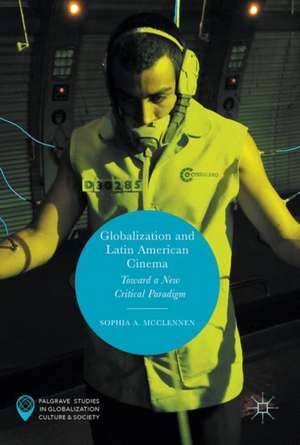Globalization and Latin American Cinema: Toward a New Critical Paradigm: Palgrave Studies in Globalization, Culture and Society
Autor Sophia A. McClennenen Limba Engleză Hardback – 7 iun 2018
Studying the case of Latin American cinema, this book analyzes one of the most public - and most exportable- forms of postcolonial national culture to argue that millennial era globalization demands entirely new frameworks for thinking about the relationship between politics, culture, and economic policies. Concerns that globalization would bring the downfall of national culture were common in the 1990s as economies across the globe began implementing neoliberal, free market policies and abolishing state protections for culture industries. Simultaneously, new technologies and the increased mobility of people and information caused others to see globalization as an era of heightened connectivity and progressive contact. Twenty-five years later, we are now able to examine the actual impact of globalization on local and regional cultures, especially those of postcolonial societies. Tracing the full life-cycle of films and studying blockbusters like City of God, Motorcycle Diaries, and Children of Men this book argues that neoliberal globalization has created a highly ambivalent space for cultural expression, one willing to market against itself as long as the stories sell. The result is an innovative and ground-breaking text suited to scholars interested in globalization studies, Latin-American studies and film studies.
| Toate formatele și edițiile | Preț | Express |
|---|---|---|
| Paperback (1) | 735.38 lei 43-57 zile | |
| Springer International Publishing – 24 ian 2019 | 735.38 lei 43-57 zile | |
| Hardback (1) | 1121.94 lei 43-57 zile | |
| Springer International Publishing – 7 iun 2018 | 1121.94 lei 43-57 zile |
Preț: 1121.94 lei
Preț vechi: 1368.21 lei
-18% Nou
Puncte Express: 1683
Preț estimativ în valută:
214.71€ • 223.33$ • 177.26£
214.71€ • 223.33$ • 177.26£
Carte tipărită la comandă
Livrare economică 14-28 aprilie
Preluare comenzi: 021 569.72.76
Specificații
ISBN-13: 9783319570594
ISBN-10: 3319570595
Pagini: 543
Ilustrații: XVIII, 544 p.
Dimensiuni: 148 x 210 mm
Greutate: 0.82 kg
Ediția:1st ed. 2018
Editura: Springer International Publishing
Colecția Palgrave Macmillan
Seria Palgrave Studies in Globalization, Culture and Society
Locul publicării:Cham, Switzerland
ISBN-10: 3319570595
Pagini: 543
Ilustrații: XVIII, 544 p.
Dimensiuni: 148 x 210 mm
Greutate: 0.82 kg
Ediția:1st ed. 2018
Editura: Springer International Publishing
Colecția Palgrave Macmillan
Seria Palgrave Studies in Globalization, Culture and Society
Locul publicării:Cham, Switzerland
Cuprins
1. Introduction.- Section One: Process.- 2. Coproduction.- 3. Distribution.- 4. Exhibition.- Section Two: Place.- 5. Argentina.- 6. Brazil.- 7. Mexico.- Coda.- 8. On Location: Is Titanic a Mexican Movie?.
Notă biografică
Sophia A. McClennen is Associate Director of the School of International Affairs, Director of the Center for Global Studies, and Professor of International Affairs and Comparative Literature at the Pennsylvania State University.
Textul de pe ultima copertă
Studying the case of Latin American cinema, this book analyzes one of the most public - and most exportable- forms of postcolonial national culture to argue that millennial era globalization demands entirely new frameworks for thinking about the relationship between politics, culture, and economic policies. Concerns that globalization would bring the downfall of national culture were common in the 1990s as economies across the globe began implementing neoliberal, free market policies and abolishing state protections for culture industries. Simultaneously, new technologies and the increased mobility of people and information caused others to see globalization as an era of heightened connectivity and progressive contact. Twenty-five years later, we are now able to examine the actual impact of globalization on local and regional cultures, especially those of postcolonial societies. Tracing the full life-cycle of films and studying blockbusters like City of God, Motorcycle Diaries, and Children of Men this book argues that neoliberal globalization has created a highly ambivalent space for cultural expression, one willing to market against itself as long as the stories sell. The result is an innovative and ground-breaking text suited to scholars interested in globalization studies, Latin-American studies and film studies.
Caracteristici
Offers an exciting new way of thinking about national and regional cinemas through a bravura blend of political economy, policy analysis, and international cultural studies Mixes discourses and methods that are usually kept separate Argues that neoliberal globalization has created a highly ambivalent space for cultural expression























